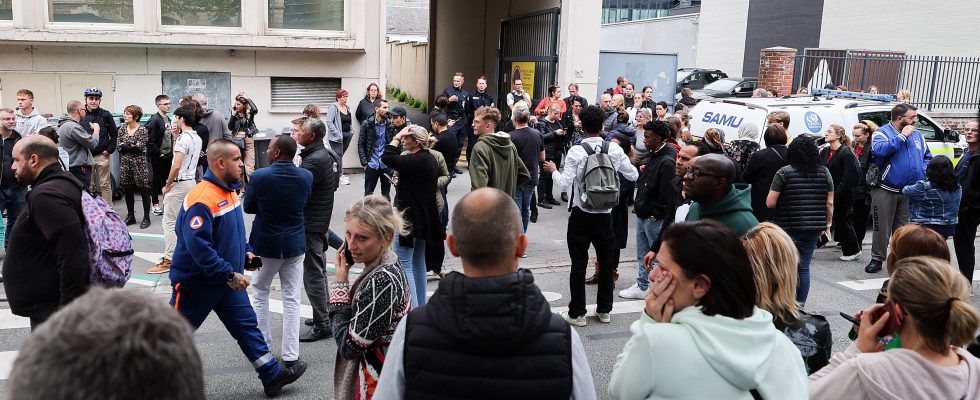Incomprehension and fear. These emotions have dominated within the teaching community since the assassination of one of their colleagues this Friday, October 13. Literature teacher Dominique Bernard was stabbed in the Gambetta high school in Arras (Pas-de-Calais) by a man of Chechen origin with an S file, after interposing himself between the killer and his students. The President of the Republic Emmanuel Macron and the Minister of National Education Gabriel Attal immediately went to the scene. This tragedy comes three years almost to the day after the attack against Samuel Paty, professor of history and geography at the Bois d’Aulne college, in Yvelines, also the victim of an Islamist terrorist. Jean-Pierre Obin, former inspector general of National Education who has just left The teachers are afraidpublished by L’Observatoire, fears an increase in self-censorship among teachers already experiencing a great feeling of loneliness.
L’Express: Three years after the assassination of Samuel Paty, could we expect a new attack targeting the school?
Jean-Pierre Obin: Unfortunately, yes. In the past, Islamists have repeatedly claimed that French public schools act as a target for them. I would particularly like to draw attention to a revelation made by Florence Bergeaud-Blackler in her latest book Brotherhood and its networks (Odile Jacob, 2023). The author reveals what she calls a “strategic document” of the Muslim Brotherhood in which the latter express the following demand: that we separate, at school, Muslim students from non-Muslims and that we avoid to give them the same programs to preserve the “purity” of their religious and cultural essence. If France in general is targeted by Islamists, it is also because of its history. The fact that it represents the homeland of the Universal Declaration of Human Rights and the country of Enlightenment contradicts religious law. Added to this today is the international context: this week, history teachers were particularly solicited and questioned by their students on the conflict in the Middle East.
It seems that the Arras terrorist has affirmed his desire to attack history teachers in particular. Does this mean that the latter would be particularly exposed?
In any case, I realized during my recent survey that these teachers are the ones who self-censor the most. They are also the ones who encounter the most incidents with their students. Let us also not forget that they were particularly affected by the death of their colleague Samuel Paty who was also a history professor. Everyone feels concerned, sometimes weakened and in professional insecurity. But they are not the only ones. I am thinking in particular of this philosophy professor whom I quote in my latest book: the latter had reminded a student, who was wearing an abaya, that this type of clothing was prohibited and that he would be obliged to report it to the principal. The young girl replied that it was cultural clothing, but this teacher from the Middle East stood up to her by replying: “No, it is indeed a prayer abaya that you are wearing.” Which led to him being called “racist” and “Islamophobic” by the student in question, supported by her friends. This professor’s anger gives way to fear when, upon his return home, his wife reproaches him: “But what did you do? Did you think of Samuel Paty? You are not protected!”
It’s a fact: many teachers self-censor because they don’t feel protected by the institution…
Yes, 80% of teachers say they fear finding themselves in a situation that could put them in danger because of religion. That’s not nothing, 80%! And yet, this fear is not relayed at the collective level, whether at the level of their hierarchy or at the level of their union representatives. We are far from having learned the lessons from the Paty affair, I would even say that the situation has gotten worse in three years. In my book, a teacher faced with an incident deplores not having the support of his head of school. From there, it is obvious that he cannot hope for the support of Dasen (Academic Director of National Education Services, Editor’s note), the rector or the minister. Without the support of its management staff, there is no point in going further. And on the union side, the silence is abysmal. Because we always come up against this old left-wing reflex which consists of saying: “Muslims are already victims, let’s not add to their misfortune.” The fear of offending students and being accused of Islamophobia causes people to remain silent. This is why I talk about internalized fear. Many teachers feel terribly isolated today, hence the urgency of protecting them and restoring a sense of security.
Can this new drama cause a shock or will it, on the contrary, worsen the phenomenon of self-censorship in National Education?
Since 2015, experience has shown that each attack is followed by a wave of emotion, rejection and condemnation. But it falls very quickly. Many teachers told me that, in order not to be overcome by fear and to avoid reactivating the trauma, they preferred to avoid thinking about past tragedies. A teacher from a vocational high school recently confided to me her anger against the institution which she accused of “doing anything”. “Look at these anti-intrusion exercises, it’s a huge farce!”, she exclaimed. However, the Arras attack demonstrated that these exercises could, on the contrary, be very useful. We often tend to place the weight of responsibility on the institution and not on Islamism. Anything that can reactivate emotion, in particular commemorations of attacks, sometimes arouses rejection. As long as we do not face the problem head-on and develop a long-term strategy – particularly in schools which must be a priority since it trains the French of tomorrow – we will continue to navigate by sight.
